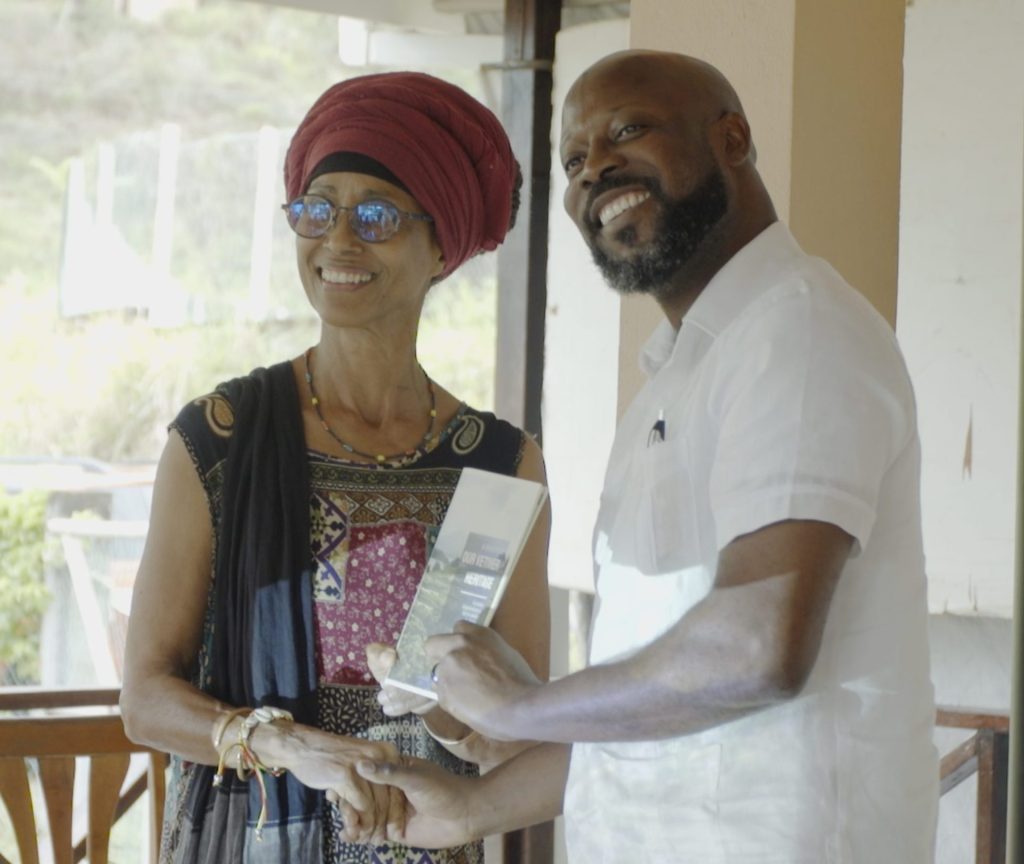The St. Vincent and the Grenadines Conservation Fund’s Farmland Restoration Project in North Leeward closed its first phase of year-long activities with a “Project Achievement” event on May 22nd at the Cumberland Recreational Facility. The project was implemented by local civil society organisation Hand2Earth and focused on soil regeneration and erosion prevention in farmlands.
The project farmers, graduates of the project’s Vetiver Systems Technology training program conducted in June-August 2022, were praised for their continued participation in project activities over a year-long period and presented with locally produced natural pesticides and fertilisers, spray cans and a laminated aerial photograph of their farmlands.
The project farmers cultivate among remains of historical vetiver contour plantings that were established almost one hundred years ago during their great grand-parents generation. Although abandoned in the 1960s, contour farming with vetiver is now recognised globally as providing the most effective intervention for soil regeneration, erosion and natural hazard management.
In his address, Parliamentary Representative for the North Leeward constituency, Hon. Minister Carlos James, reinforced the importance of the initiative in the context of the Global Sustainable Development Goals, congratulating the participant farmers on their input and continued motivation. He reinforced the importance of their practices as impacting the management of natural resources in for climate change resilience.
St. Vincent and the Grenadines Conservation Fund’s CEO Mr. Vanburn Harry stated that his organisation is extremely proud of the project’s achievements -particularly of the positive attitudes and achievements of the participants- saying that the project has created a legacy that will be in the area for generations and hopes to see its impact expand throughout the island and beyond. He further stated that SVGCF prides itself on the success of its Grantees, and that they are very happy with the revival of the Vetiver system in the North leeward constituency. He stated that the project in itself is extraordinary and very unique- It is the only project in St. Vincent and the Grenadines and the OECS that integrates the vetiver system technology with modern farming practices. Harry expressed that The project not only addresses applications for farmland restoration and land conservation, but it also addresses food security and sustainable livelihoods for farmers in St. Vincent’s North Leeward Orange Zone.
Hand2Earth’s Project Designer and Vetiver Systems Specialist, Ms. Vonnie Roudette, described the project as having “overachieved by almost 200%” stating that the project had trained 34 farmers in Vetiver Systems Technology and soil conservation, installed double the target number of farm site installations as well as 3 vetiver nurseries. As a measure of success of the project she stated “several more farmers are requesting vetiver nurseries and having heard about its benefits through the participants, many other farmers are ready to adopt contour farming in their farms”. Project farmers expressed their determination to continue working together to expand the activities further afield and pass on their knowledge to the youth.
As part of its community educational component, the project hosted 8 educational tours of sites installed with the Vetiver System for farmers, community members, classroom sessions and field trips for students. The tours educated community members about the local history and benefits of vetiver grass in productive farm systems. As part of the project design, participant farmers were the tour guides during these outings to facilitate their role as community educators and custodians of sustainable farming practices.
A highlight of the Event was the launch of an educational booklet for students and farmers entitled “A Return to Our Vetiver Heritage: Farmland Restoration in North Leeward St. Vincent”. The illustrated booklet provides an introduction to vetiver contour farming and the local history of vetiver, as well as an account of vetiver being used for soil conservation in St. Vincent since the early 1900s. Throughout her presentation Roudette stressed that, based on her research, St. Vincent’s north leeward area was the site of the first and most extensive soil conservation initiative in the region.
Roudette thanked Minister James for his attendance and support throughout the project, and the SVG Conservation Fund for its vision in funding the project. She also commended St. Vincent’s Prisons for providing a site to allocate an area for the prisoners to build on their training through setting up a vetiver systems farm for eco-agricultural education and prisoner rehabilitation.

